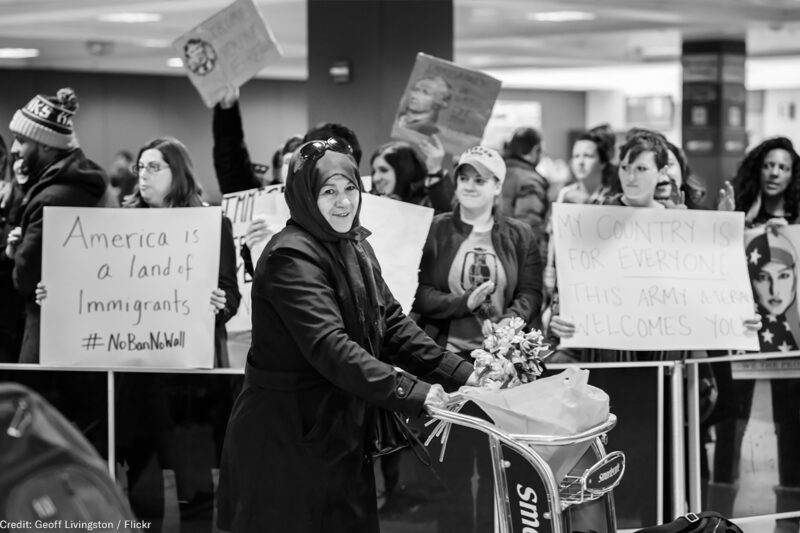
President Trump signed the third version of his Muslim ban executive order on Sept. 24, about two weeks before the case involving the second version of the ban was to be argued before the Supreme Court. This action led the court to cancel oral arguments on the earlier version so that the parties could address whether the new order renders the Trump administration’s appeal moot.
In the meantime, the ACLU has returned to the federal district court to challenge the new order, which is set to go into effect on Oct. 18.
The new ban indefinitely bans people from Iran, Libya, Syria, Yemen, and Somalia, five overwhelmingly Muslim countries that were also targeted by the earlier versions. The order emphasizes that countries are being banned because they have not cooperated in providing information for visa vetting. Yet Somalia remains banned even though it does live up to the government’s new visa cooperation standards.
The order adds restrictions on Chad — another Muslim-majority nation — along with North Korea and Venezuela. The inclusion of two countries that are not Muslim majority doesn’t even qualify as a fig leaf. North Korea accounted for just 61 affected visas last year — out of more than 75 million visitors to the United States.
And Venezuela as a country is not banned in any meaningful sense. Only certain Venezuelan government officials and their families are affected, and those individuals are only barred from obtaining tourist and temporary business visas. In contrast, nearly every single person from the Muslim-majority countries is barred from getting a green card, no matter what family, business, or other U.S. connections he or she has.
The total numbers underscore the scope of suffering the new ban will impose, if allowed to go into effect, and the hugely disproportionate impact it will have on Muslims. According to an analysis of the number of U.S. visas granted by category in 2016, the new ban would bar tens of thousands of individuals from Iran, Libya, Syria, Yemen, and Somalia annually from obtaining green cards.
Many of these are people coming to the U.S. to join their husbands, wives, parents, and children who are citizens or lawful permanent residents. These families would be separated indefinitely. By contrast, the impact on people from countries newly included in the ban is small: 40 immigrants from Chad can expected to be blocked, nine from North Korea, and none at all from Venezuela.
The new ban, like the old ones, is illegal. The March version of the ban is unconstitutional because, as the Court of Appeals for the Fourth Circuit recognized, the ban violates the Establishment Clause by disfavoring a specific religion. “When the government chooses sides on religious issues,” the court explained, “the inevitable result is hatred, disrespect and even contempt towards those who fall on the wrong side of the line.”
The court noted that there was a “direct link” between Trump’s “numerous campaign statements promising a Muslim ban that targets territories,” the original ban he signed in January — “only one week into office executing that exact plan” — and the second, “watered down” version of the ban, as Trump called it.
As a candidate, Donald Trump posted a statement “On Preventing Muslim Immigration” calling for “a total and complete shutdown of Muslims entering the United States.” He claimed that “Islam hates us” and that there are “problems with Muslims coming into the country.” When this was met with outrage, Mr. Trump told the world that he would achieve the same goal without explicitly naming Muslims.
“People were so upset when I used the word Muslim,” he explained. “Oh, you can’t use the word Muslim. Remember this. And I’m okay with that, because I’m talking territory instead of Muslim.”
This third Muslim ban is yet another attempt to follow through on that campaign pledge and to paper over the president’s plain religious animus, which he has never disavowed. The courts have not been fooled and have rightly seen the previous versions of the order as unreasonable, immoral, and unconstitutional. The same is true of this one.

